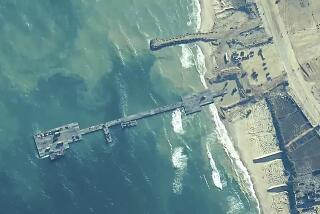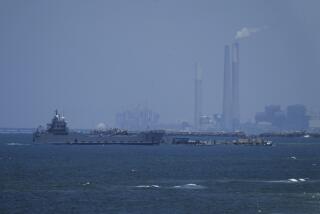Food Convoys Reaching Remote Hunger Zones : Somalia: Operation Restore Hope is days ahead of schedule, U.S. officers say.
- Share via
MOGADISHU, Somalia — Convoys of food, escorted by heavily armed American and French troops, ventured outside the famine-belt city of Baidoa for the first time Thursday, reaching into remote areas where anarchy had reigned only days before and prompting delighted aid agencies to begin a massive buildup of relief efforts in the besieged country.
U.S. military commanders, saying the smooth-running mission was days ahead of schedule, prepared Thursday for the next important stage in Operation Restore Hope--the occupation of Kismayu, Somalia’s second-largest port city, south of Mogadishu.
“Kismayu is a high priority,” said Marine Lt. Col. Fred Peck, spokesman for the joint military forces. But he added that Kismayu is only one of five more cities in southern Somalia that have been targeted by the U.N.-approved military mission. Among them is Bardera, south of Baidoa and deeper in the region racked by famine.
Dozens of armored vehicles and Humvees, supported by helicopter gunships, escorted 10 truckloads of food to four villages within a 35-mile radius of Baidoa. Hundreds of residents of the region turned out to welcome the convoy. But many others were too weak with hunger to appear.
Troops encountered no resistance, although it was reported that armed bandits stole some of the food delivered to one village shortly after the troops left town.
Tens of thousands of starving people are being fed inside Baidoa.
But in the countryside, attempts to deliver food in the past have been plagued by looting. Reaching rural areas is a priority because famine relief officials fear they are missing many starving people there.
An estimated 2 million Somalis are at risk of starvation. So far, at least 300,000 have died of hunger, and the daily death toll countrywide exceeds 200.
Although relief officials have reached many thousands, and the famine is said to have eased somewhat, their efforts have been blunted in recent months by attacks on food shipments and the cost of hiring armed security guards and bribing local warlords.
A key obstacle to the international relief effort has been the inability, except in a few cases, to move food overland from Somalia’s port cities of Mogadishu and Kismayu. The port in Mogadishu now is under U.S. control, and U.N. officials say 40 ships carrying relief supplies are due to dock here in the next two months.
But relief ships have been unable to dock in Kismayu since Oct. 2, due to inter-clan warfare there. Ian MacLeod, spokesman for the U.N. relief effort here, said Thursday that reopening the port to donated food is crucial to battling Somalia’s famine.
In coming days, Robert Oakley, the U.S. special envoy to Somalia, and Marine Col. Kevin Kennedy, a liaison officer, will go to Kismayu to talk with local leaders who are embroiled in a bitter battle for political power.
In Kismayu, Western relief workers say that the forces of an Ogaden clansman named Col. Omar Jees have battled those of Mohammed Farah Aidid for control of the city.
But there have been other reports indicating that Gen. Mohamed Siad Hirsi, who goes under the nom de guerre “Gen. Morgan,” is desperately trying to take over Kismayu before Americans arrive in full force.
Morgan is the son-in-law of former President Mohamed Siad Barre, whose ouster in January, 1991, triggered widespread violence. Siad Barre’s troops have been blamed for stealing food and burning homes.
Unlike the two other major political figures in Somalia, Aidid and Ali Mahdi Mohamed, Morgan has yet to express support for the arrival of the first of 28,000 foreign troops. And officials fear that Morgan, who also controls Bardera, another future U.S. military target, will resist the troop arrivals.
Only three relief agencies have operations in Kismayu, feeding thousands of famine refugees with airlifted food. Officials say the cost of feeding those people would fall 75% if food could be brought in by ship.
U.S. Marine commanders say the first protected convoy of food from Mogadishu to Baidoa, 200 miles northwest, is tentatively scheduled for Sunday. Although the road will not be secured, American troops and others in the multinational force will guard the trucks.
If, as expected, that convoy passes peacefully, it will open the most important corridor into the country’s interior. Baidoa is the first stop on the way to most villages affected by the famine.
Meanwhile, the number of U.S. forces in Somalia topped 6,000 on Thursday, with the arrival of nearly 500 Marines and Army soldiers. They are backed up by about 1,600 troops from other countries, including France, Italy, Saudi Arabia and Canada.
In Germany on Thursday, Chancellor Helmut Kohl’s government offered to send 1,500 armed troops--including medical and self-defense forces--to join the Somali effort, in a controversial move that could redefine united German military powers. The troops would be the first armed German soldiers dispatched outside the North Atlantic Treaty Organization arena since World War II.
The number of German troops appears relatively small given Germany’s size and wealth. India, for example, announced Thursday that it was sending 2,500 soldiers to Somalia. Bonn also pledged another $40 million in aid to Somalia, including more planes to transport food and medicine. Japan pledged $100 million today to the aid effort, but refused to send troops.
In Mogadishu, Gen. Joseph Hoar, commander in chief of the U.S. Central Command, arrived Thursday on a visit. And the American presence here is expected to soar in coming days. The planned total of 28,000, from the Marine, Army, Navy and Air Force, is expected to be reached within 10 days.
But Somalis continue to express concern about the growing number of weapons evident on the streets of Mogadishu. Most guns disappeared from the city the day the Marines landed last week, but they have steadily reappeared, often in areas of the city not regularly patrolled by U.S. troops.
“That is cause for concern,” admitted Peck, the Marine spokesman. But, he added, the American forces here do not plan--and never have planned--to disarm the entire population of Somalia.
Peck said that “technicals,” vehicles with mounted machine guns and other arms, still are considered “hostile” and will be fired on by any soldiers they encounter.
Times staff writers Mark Fineman in Kismayu, Somalia, Tamara Jones in Bonn and Melissa Healy and Art Pine in Washington contributed to this report.
More to Read
Sign up for Essential California
The most important California stories and recommendations in your inbox every morning.
You may occasionally receive promotional content from the Los Angeles Times.











